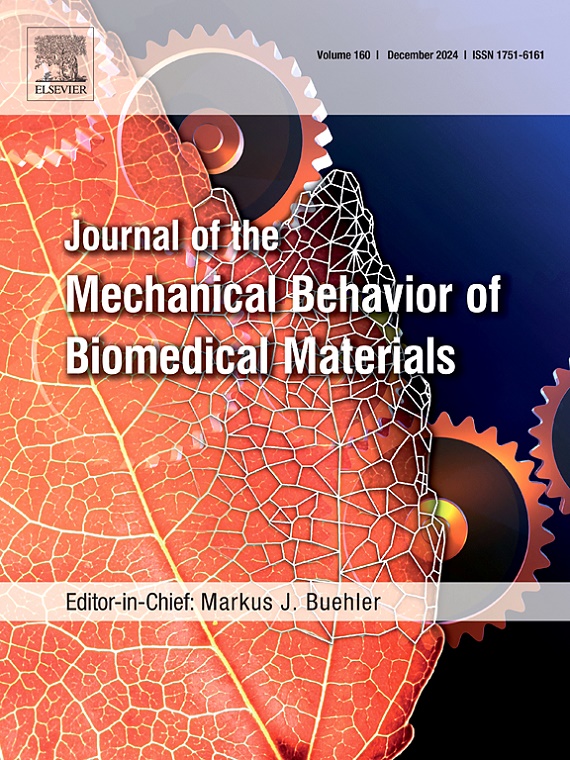估算核振动的自然频率,评估选择性超声消融癌细胞的可行性
IF 3.3
2区 医学
Q2 ENGINEERING, BIOMEDICAL
Journal of the Mechanical Behavior of Biomedical Materials
Pub Date : 2024-10-11
DOI:10.1016/j.jmbbm.2024.106778
引用次数: 0
摘要
用超声波选择性地消融癌细胞将改变癌症治疗方法,但目前还无法实现。一个关键的挑战是,癌细胞和非癌细胞通常具有相似的声阻抗,因此在对超声波的反应上无法区分。然而,在某些癌症中,健康细胞和恶性细胞的细胞骨架和核片层结构不同,这就为利用结构差异提供了可能性,这种差异表现为不同的振动响应。为了评估某些癌细胞的细胞核以不同频率振动的可能性,我们测量了来自多个细胞系和大脑区域的一系列癌细胞和非癌细胞的尺寸和有效压入模量,并估算了细胞核振动的自然频率。结果表明,某些癌细胞和非癌细胞的核振动固有频率可能相差数十千赫。这一差距可能足以进行选择性消融,并促使未来对这些特定细胞类型进行实验。本文章由计算机程序翻译,如有差异,请以英文原文为准。
Estimates of natural frequencies for nuclear vibration, and an assessment of the feasibility of selective ultrasound ablation of cancer cells
Selective ablation of cancer cells by ultrasound would be transformative for cancer therapy, but has not yet been possible. A key challenge is that cancerous and non-cancerous cells typically have similar acoustic impedance and are thus indistinguishable as materials in their responses to ultrasound. However, in certain cancers, cytoskeletal and nuclear lamin structures differ between healthy and malignant cells, opening the possibility of exploiting structural differences that manifest as different vibrational responses. To assess the possibility that the nuclei of certain cancerous cells might vibrate at different frequencies, we measured sizes and effective indentation moduli of a range of cancerous and non-cancerous cells from several cell lines and regions of the brain, and estimated the natural frequencies for nuclear vibration. Results suggest a potential difference in natural frequency for nuclear vibration between certain cancerous and non-cancerous cells, on the order of tens of kHz. This gap is potentially sufficient for selective ablation and motivates future experimentation on these specific cell types.
求助全文
通过发布文献求助,成功后即可免费获取论文全文。
去求助
来源期刊

Journal of the Mechanical Behavior of Biomedical Materials
工程技术-材料科学:生物材料
CiteScore
7.20
自引率
7.70%
发文量
505
审稿时长
46 days
期刊介绍:
The Journal of the Mechanical Behavior of Biomedical Materials is concerned with the mechanical deformation, damage and failure under applied forces, of biological material (at the tissue, cellular and molecular levels) and of biomaterials, i.e. those materials which are designed to mimic or replace biological materials.
The primary focus of the journal is the synthesis of materials science, biology, and medical and dental science. Reports of fundamental scientific investigations are welcome, as are articles concerned with the practical application of materials in medical devices. Both experimental and theoretical work is of interest; theoretical papers will normally include comparison of predictions with experimental data, though we recognize that this may not always be appropriate. The journal also publishes technical notes concerned with emerging experimental or theoretical techniques, letters to the editor and, by invitation, review articles and papers describing existing techniques for the benefit of an interdisciplinary readership.
 求助内容:
求助内容: 应助结果提醒方式:
应助结果提醒方式:


